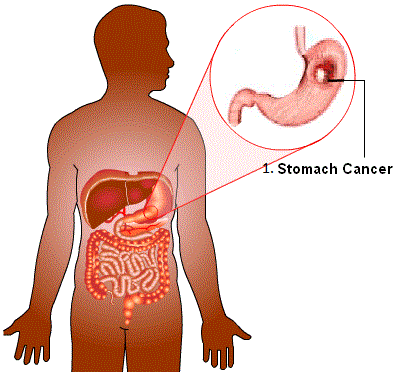Stomach Cancer From Smoking
The number of men with stomach cancer in the United States has fallen by 60%. According to the researchers, this is largely because the number of H. Pylori infections has decreased. But also because fewer people smoke. By continuing to address these risk factors, the number of people with gastrointestinal cancer will probably decrease further in the future.
The number of people with stomach cancer in the United States has fallen dramatically in recent years. Nevertheless, stomach cancer remains number 2 in the list of most deadly cancers in the US. As soon as stomach cancer is established, the outlook is often bad. Survival opportunities after 5 years are only 27%. It is therefore very important to prevent stomach cancer.
About 50% of the stomach cancer in men in the US are "intestinal-type non-cardiac adenocarcinomas". These tumors originate from gastrointestinal glands and occur mainly in the lower part of the stomach. The main risk factors for this type of cancer are an infection with Helicobacter Pylori and smoking. The number of people who smoke or has an H. Pylori infection has fallen in recent years. This study examined whether this is also the cause of the decline in stomach cancer.
Research
Data from the number of smokers and H. Pylori infections reached the researchers from two other major studies (NHANES and NHIS). The rural database SEER contains data on the number of men with stomach cancer. Based on these figures it is estimated how many stomach cancer is caused by smoking or H. Pylori infections.
Results
Between 1978 and 2008, the number of men with stomach cancer has fallen from 11.0 to 4.4 in the 100,000. This is a decline of 60%. According to the calculations, 47% of this decrease is explained by the decrease in H. Pylori infections and smoking.
Only the decrease in H. Pylori infections already accounts for 43% of the decrease in stomach cancer. Smoking explains 3% of the decrease in the number of stomach cancer. The researchers estimated that the number of stomach cancer between 2008 and 2040 decreased by another 47%. H. Pylori and smoking then account for 81% of this decrease.
Conclusion
The decrease in the number of men with stomach cancer is explained almost half by the fall in H. Pylori infections and smoking. Tackling risk factors thus contributes to a reduction in stomach cancer. The researchers expect the number of stomach cancer to fall even further in the future. Probably, 81% of that drop is due to less H. Pylori infections and less smoking. It is therefore important to continue to address these risk factors in the future. One disadvantage is that the calculations in this study are partly based on assumptions. In addition, the researchers looked at only one type of stomach cancer and only in men.
The number of people with stomach cancer in the United States has fallen dramatically in recent years. Nevertheless, stomach cancer remains number 2 in the list of most deadly cancers in the US. As soon as stomach cancer is established, the outlook is often bad. Survival opportunities after 5 years are only 27%. It is therefore very important to prevent stomach cancer.
About 50% of the stomach cancer in men in the US are "intestinal-type non-cardiac adenocarcinomas". These tumors originate from gastrointestinal glands and occur mainly in the lower part of the stomach. The main risk factors for this type of cancer are an infection with Helicobacter Pylori and smoking. The number of people who smoke or has an H. Pylori infection has fallen in recent years. This study examined whether this is also the cause of the decline in stomach cancer.
Research
Data from the number of smokers and H. Pylori infections reached the researchers from two other major studies (NHANES and NHIS). The rural database SEER contains data on the number of men with stomach cancer. Based on these figures it is estimated how many stomach cancer is caused by smoking or H. Pylori infections.
Results
Between 1978 and 2008, the number of men with stomach cancer has fallen from 11.0 to 4.4 in the 100,000. This is a decline of 60%. According to the calculations, 47% of this decrease is explained by the decrease in H. Pylori infections and smoking.
Only the decrease in H. Pylori infections already accounts for 43% of the decrease in stomach cancer. Smoking explains 3% of the decrease in the number of stomach cancer. The researchers estimated that the number of stomach cancer between 2008 and 2040 decreased by another 47%. H. Pylori and smoking then account for 81% of this decrease.
Conclusion
The decrease in the number of men with stomach cancer is explained almost half by the fall in H. Pylori infections and smoking. Tackling risk factors thus contributes to a reduction in stomach cancer. The researchers expect the number of stomach cancer to fall even further in the future. Probably, 81% of that drop is due to less H. Pylori infections and less smoking. It is therefore important to continue to address these risk factors in the future. One disadvantage is that the calculations in this study are partly based on assumptions. In addition, the researchers looked at only one type of stomach cancer and only in men.
*Image source : Wikimedia Commons
References :

Post a Comment for "Stomach Cancer From Smoking"